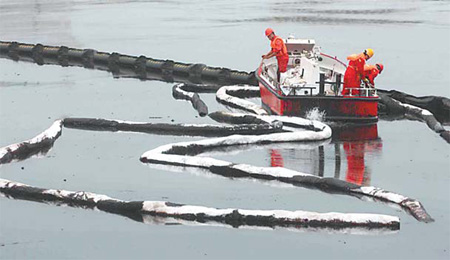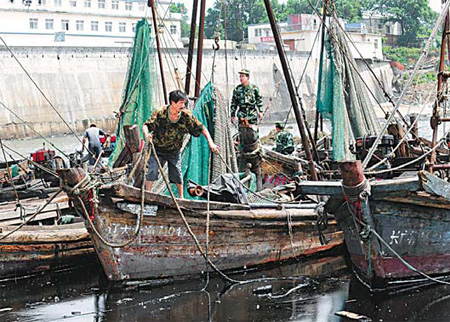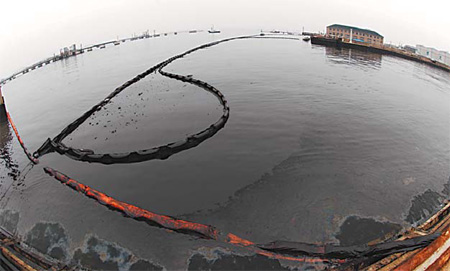Society
Keeping watch over the waters
By Zhang Xiaomin in Dalian, Hu Yinan, Hu Yongqi, Li Jing, Cao Li in Beijing (China Daily)
Updated: 2010-07-20 07:49
 |
Large Medium Small |
|
|
The July 16 oil spill on Dalian's coast, while smaller and more controllable than the infamous Gulf of Mexico spill, is nonetheless a major environmental disaster that will pose a hazard to the area's ecosystem for the next 10 years, despite all the cleanup efforts, researchers say.
Even after the estimated 15-day cleanup, all the pollutants will not be gone, said Zhao Zhangyuan, a researcher with the Chinese Research Academy of Environmental Sciences.
"They will decompose and then spread," he said. "It will affect our ecosystems in the same way the Mexico Gulf accident will affect that area. Ours is different only in its degree and scale."
The decomposed oil could cause a cancer risk, Zhao said. "Fish, algae and other creatures in the contaminated water will not survive and birds will fly away," he said. Many of the birds will die, researchers agreed.
Oil spill cleanups are a challenge for any country. If not handled properly, destruction could follow, said Ma Yong'an, a researcher with the National Marine Environment Monitory Center (NMEMC).
Xu Guochen, secretary-general of Dalian's city government, said at a press conference on Monday morning that all the 1,500 tons of spilled oil is expected to be removed within five to seven days. But Wu Guogong, deputy director of the local environmental protection bureau, said the contaminated water will be removed in five to 10 days.
By Sunday, 180 tons of oil had been recollected and on Monday, 160 tons of oil removed.
Wu dispelled Zhao's claims, saying the impact would not be that severe. "The amount of the spilled oil is not large and 10 years is an improper estimate," he said. The investigation on the environmental damage will start soon, he said.
The Dalian incident has aroused widespread public attention as a comparison to the recent Gulf of Mexico oil spill, the largest offshore spill in United States history. The struggle to clean up is ongoing. The Dalian accident happened at a time when China is accelerating offshore oil drilling, and the sea water quality in some regions is worsening.
At 6:10 pm July 16, a petroleum port on China's northeast coastline was rocked when two pipelines exploded and an oil spill followed.
The crude oil gushed into the Yellow Sea and is spreading at a fast speed though an oil fence put in place to try to stop it. Clean-up vessels are trying to stop the flow.
On Saturday evening, local authorities announced that some 50 square kilometers of water has been affected. One day later, its impact was expanded to an area of 183 sq km.
|
|
On Sunday morning, the coastline was covered with thick, black oil. The water farther away was stained as well, glittering with the iridescent colors of petroleum. In some areas, the layer of oil is one meter deep.
A China Daily reporter who managed to enter the port area on Sunday immediately smelled the intense, pungent odor of petroleum.
A netizen named "Dalian old folk" blogged on sina.com that evening that he could smell petroleum while walking on a Jinzhou district street, some 20 km away from the port.
The fumes' gases contain sulphur and aromatic hydrocarbon that are not fatally toxic, Xu said.
Wu Jianjun, 21, who runs an Internet caf near the site, said on Monday afternoon that the smell had dissipated. But a China Daily reporter that day still smelled a slight smell of petroleum in the area.
Wu and other residents said they felt a bit dizzy but they are not sure whether it is from the oil.
About 1,600 people, including employees at the port and residents within five km of the site, were evacuated and sent to hotels, said Yang Miao, director of a special police force with the Dalian municipal public security bureau. The residents have begun returning to their homes.
According to Maritime Safety Administration, work is ongoing to contain the oil slick to a certain area, mostly by setting up oil fences. Efforts are being made to divert the oil slick from ecological sensitive areas.
Several measures to get rid of the crude oil, such as using oil-absorbing mats and utilizing oil-skimming boats, are being used to recollect the crude oil that spewed into the sea water.
Sometimes, chemical dispersants are used to break down the oil, but this method is the least recommended as their toxicity might harm the fish, and therefore the fishery industry.
Wang Bin, deputy director of the environmental protection department at the State Oceanic Administration, said several hundred vessels are working to skim the oil slick, while local fishermen have also joined the efforts using straw mattresses and fishnets to absorb and collect the crude oil.
"The oil spill has been contained to the port area, where the environmental standard is relatively low, so the impact on the ecology should be quite limited at this stage," Wang said.
Wang Xiaokan, a 32-year-old fisherman, was told Tuesday to help with the cleanup effort.
"I was given oil absorbing mats to collect the oil and plastic sheets to hold it. The oil will then be pumped into big boats and sent back to the company," he said.
Huang Yong, vice-director of local maritime safety bureau, said that more than 800 fishing boats started to help clean up on Monday.
Luan Yujuan, vice-director of the local oceanic and fishery bureau, said 100 more fishing boats joined the effort Monday afternoon.
Wang has been fishing on the Dalian coast for more than 10 years and lives about 500 meters away from where the explosion happened.
"On Friday evening, I heard a big bang and saw black fumes rising from the port area. I did not run away but was evacuated the next morning," he said.
He was worried about his boat and sneaked back Saturday evening to check on it, which luckily was unaffected by the blast. But he and other fishermen are still worried.
Wang said he is not sure about the impact to his fishing business as June, July and August are closed seasons. "But if the oil is not cleaned up and the fish are poisoned, my business will definitely be affected," he said.
An oil spill harms a variety of species, but most notably birds, Ma said. Death is a virtual certainty for affected birds, he said.
In Alaska, after the Exxon Valdez spill in 1989, Exxon power-washed oiled beaches with high-pressure hot-water sprayers. But scientists ultimately determined that this practice was a disaster for the tidal ecology, with clams and other organisms showing much-delayed recoveries on the laundered beaches, compared with oiled beaches that were not cleaned.
Ma's view was echoed in Germany by Silvia Gaus, a biologist at the Wattenmeer National Park along the North Sea, who said few, if any, oil-soaked birds will survive, regardless of the best attempts to clean them and release them back into the wild.
Efforts to catch and clean oil-soaked birds often lead to fatal amounts of stress for them, and the birds will eventually perish from kidney and liver damage, Gaus said.
|
|
"According to serious studies, the middle-term survival rate of oil-soaked birds is less than 1 percent," she said. Gaus worked on the environmental cleanup of the Pallas, a wood-carrying cargo ship that spilled 90 tons of oil in the North Sea in 1998. Around 13,000 birds drowned, froze or died due to stress as a result of that spill.
In a report dated July 16, the US Fish and Wildlife Service said 2,624 dead animals had been collected after the recent oil slick, including 2,095 birds, 467 sea turtles, 61 dolphins and other mammals, and one reptile.
The smaller sea creatures, such as plankton, are also easily affected by offshore oil leaks, scientists warn. Their massive die-off will cause larger, longer problems for the affected regions.
"If you affect those communities in any way, you affect the entire food chain. If the phytoplankton and zooplankton are killed, it's curtains," said John Caruso, an ecology and evolutionary biology professor at Tulane University.
In Dalian, local authorities said the accident has not caused air pollution.
"We have set up 20 air-quality supervision machines in the nearby region and 10 on the sea. According to the data we have collected, the air quality is still in the category of state standards and will not affect people's health," Wu said.
But an oil leak's impact on local fisheries and tourism industries, too, is well documented. The gulf leak off the US coast resulted in a "fisheries disaster" declaration in three American states. At the height of the disaster in June, the US National Oceanic and Atmospheric Administration closed commercial and recreational fishing in about 36 percent of all federal waters in the Gulf of Mexico. Time Magazine quoted analysts who said the initial losses for the fishing industry amounted to $2.5 billion, while the state of Florida alone could lose $3 billion in tourism income.
Fishing and tourism industries are among the pillar livelihoods in the Dalian area. In Beijing, some seafood stores have stopped purchasing from Dalian. A woman at a Shuangqing Road wholesale market said that she is now buying from Shandong, Hebei or Guangdong provinces. And some seafood restaurants that sell Dalian seafood are trying to find other resources if the contamination is proved.
As for the tourism industry, if past experiences are any indication, the future is far from optimistic. Two decades after a massive oil leak in Alaska - the largest spill until the recent disaster - persistent studies by the World Wildlife Foundation and groups of scientists found that as of 2009, oil from the Exxon Valdez, the tanker responsible for the slick, can still be found along many Alaskan beaches.
Although the impact has not been felt yet, experts say that the beaches close to the port could be affected soon. And if it is not put under control on time, other beaches could see a decrease of tourists too.
China is the second largest crude oil consumer in the world, according to the International Energy Agency (IEA).
In 2006, China National Offshore Oil Corp (CNOOC), one of the biggest oil companies in the country, found the first offshore deepwater natural gas well in the South China Sea and two more in the same region between 2009 and 2010. The company plans to expand oil-gas exploration between 2015 and 2020.
Some 60 percent of oil and gas fields with reserves of more than 100 million tons found in the last decade are in the ocean, according to Zhou Shouwei, deputy general manager of CNOOC and an academic with the Chinese Academy of Engineering.
"The deep ocean is where the future exploration for oil and gas will focus," he was quoted as saying by Xinhua News Agency.
"But deep-water drilling is very complicated and no country or company is able to master all of them," he said. "Strictly following the techniques and operation rules is the fundamental way to prevent accidents from happening."
Li Yan, a research fellow at the China Institute of Contemporary International Relations, said the oil spill disaster in the Gulf of Mexico should be a warning to highlight the vulnerability of the marine ecosystem and to coordinate maritime development and ocean governance.
"China is accelerating all types of marine development. More marine drilling provides more energy that the economic growth needs, and more oil transport on the sea increases the probability of marine pollution," said the researcher.
Marine conservation awareness in China lags far behind ocean exploitations, Li said.
|
|
Therefore, the Chinese government and industries must pay more attention to protect the sea ecobiology for long-term development, Li warned.
The number of oil spill cases has reached 500 each year as China has become the second largest oil importer with 90 percent of imported oil shipped on the sea, according to Zheng Binghui, vice-president of the China Research Academy of Environmental Sciences.
The oil content in some of China's coastal sea waters was two to eight times more than the national standard for sea water that humans would possibly touch, said Bao Xianwen, a professor at Ocean University of China in Qingdao, Shandong province. The national standard is 0.05 mg/l.
"This means that China's sea water quality has become a serious problem," Bao said.
The Dalian incident happened at a 15-million-ton-capacity port located in Liaodong Peninsula in the Yellow Sea, not far from Bohai Sea. In the region, thousands of offshore drilling platforms are running to exploit oil.
The port, the largest deepwater petroleum port in the country, is a crucial interchange site for crude oil from Daqing, Heilongjiang province, shipped to many regions of China and other countries. It also functions as a port to receive raw oil imported to supply energy for domestic industries.
The Friday blast happened when a Liberian oil tanker offloaded raw oil, according to Luo Lin, minister of State Administration of Work Safety.
Residents and experts agreed: China needs to sort out how to manage and protect the ocean and its coastline.
"The management of ocean is split among the departments of ocean, fishing, environmental protection, maritime transportation, custom and frontier defense," Li said. "Too many departments are involved, and no one will take the responsibility."
Also, coastal provinces are in charge of the region within their territory. "This hampers the efficiency of the comprehensive management of the ocean," Li added.
Offshore drilling is considered a high risk for oil companies in the United States and United Kingdom, where such technologies are at an advanced level. In China, where the technologies and management are less developed, more accidents could happen.
Professor Zheng said the supervision of local work safety authorities should be strengthened to avoid the potential risk of oil spills.
"Oil companies and port-managing departments should also check all sectors of oil drilling and shipping to reduce the possibility of oil spills," Zheng said, adding that emergency response plans should be made and practiced so that staff could properly handle the dangers.



